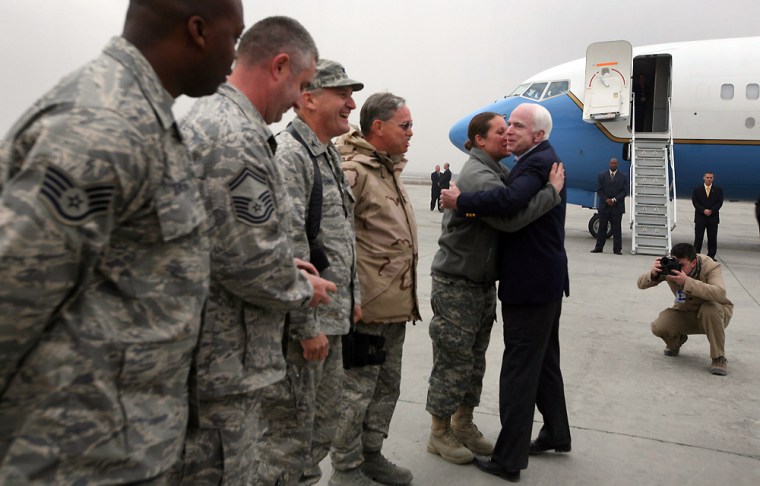Sen. John McCain said Sunday that the situation in Afghanistan will get more difficult before it gets easier — "just like the surge in Iraq was" — as the U.S. prepares to pour thousands more troops into the country, including on the doorsteps of Kabul.
The former Republican presidential candidate, who is to report back to President-elect Barack Obama, visited the southern province of Helmand, where he said NATO forces are at a stalemate with insurgents. Though Helmand has for years been the responsibility of British forces, McCain said the U.S. will focus more on the region — the heartland of the Taliban movement and a center for opium poppy production.
"We're going to have additional troops and additional help," McCain said of the country's south.
The trip comes at a time of increasing violence in Afghanistan, where a record 32,000 U.S. troops are now stationed, with requests for 20,000 more from American commanders.
Taliban chief Mullah Mohammad Omar urged Western forces on Sunday to leave Afghanistan before thousands of their troops were killed.
Omar, believed by Western intelligence to be hiding in the mountainous border area between Afghanistan and Pakistan, also said a planned increase in U.S. troops would fail to curb violence and would instead fuel the insurgency.
"I would like to remind the illegal invaders who have invaded our defenseless and oppressed people that it is a golden opportunity for you at present to hammer out an exit strategy for your forces," Omar said on the day of Eid al-Adha, the Islamic festival of sacrifice, in his yearly message.
Spike in violence
Afghanistan has seen the worst bloodshed this year since U.S.-led and Afghan forces toppled the Taliban in 2001, with at least 4,000 people killed in the first half of 2008, about a third of them civilians, and some 140 Taliban suicide bombs.
Violence has also spiked across the border in Pakistan, where gunmen blasted their way into two transport terminals on Sunday and torched more than 160 vehicles destined for U.S. and Afghan National Army troops.
The U.S. military said its losses in the raid near the northwestern city of Peshawar would have "minimal" impact on anti-Taliban operations, but the attack fueled concern that insurgents are trying to choke a vital American supply line.
In Afghanistan, insurgents this year have moved closer to Kabul, taking over wide swaths of countryside just south of the Afghan capital that are now unsafe. Attacks on supply convoys on the road leading from Kabul to the southern city of Kandahar are commonplace.
In response, U.S. commanders are sending some 3,000 to 3,500 troops from the 10th Mountain Division to the provinces of Wardak and Logar for the first time next month, said Lt. Col. Rumi Nielson-Green, a spokeswoman for U.S. forces.
U.S. Brig. Gen. Mark Milley told The Associated Press last month that road security in the two provinces would be a priority. "We want to get it so that any citizen can go from point A to point B on that road without fear," he said.
Milley said he expected to see an increase in violence south of Kabul over the coming months as the new troops attack insurgents. The militants "will have a choice. Move somewhere else, reconcile, surrender, or die," he said.
‘We're at a tough place’
McCain said it was clear there has been progress in the eastern part of Afghanistan, the region where most U.S. forces are stationed, but that Afghanistan's south deserves more attention.
"And I want to emphasize again, I think it's going to get harder before it gets easier, just like the surge in Iraq was," McCain said.
Obama asked McCain to report back to him on what he learns on the visit, said Sen. Joseph Lieberman, who accompanied McCain on the multi-day trip to Afghanistan, Pakistan, India and Iraq.
McCain, Lieberman and Sen. Lindsey Graham, all members of the Senate Armed Services Committee, had dinner with Afghan President Hamid Karzai and his Cabinet on Saturday night.
The three also met with U.S. Gen. David McKiernan, the commander of U.S. and NATO troops in the country, and a newly arrived U.S. general in the southern province of Helmand.
McCain, Lieberman and Graham were all proponents of the U.S. surge in Iraq, an influx of U.S. troops that is credited in part with helping to lower violence in that conflict. Lieberman said Iraq has seen "extraordinary progress."
"Here in Afghanistan and in neighboring Pakistan we're at a tough place, but we have confidence that working with our allies here, working with the people of Afghanistan and Pakistan, with the new effort and the new resources that will be brought in we can conclude these fights as successfully as we're progressing in Iraq," he said.
The Associated Press and Reuters contributed to this report.
